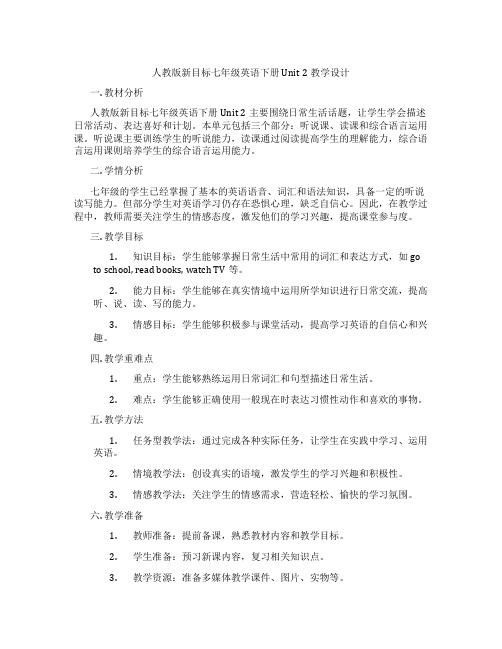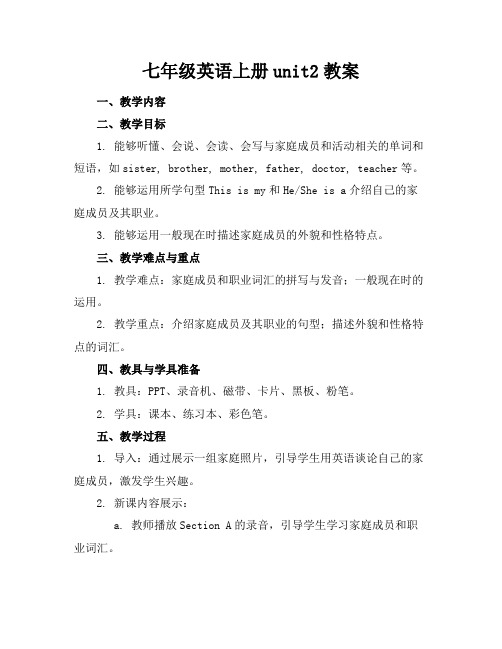unit2教学辅导
- 格式:doc
- 大小:93.00 KB
- 文档页数:13

人教版新目标七年级英语下册 Unit 2教学设计一. 教材分析人教版新目标七年级英语下册Unit 2主要围绕日常生活话题,让学生学会描述日常活动、表达喜好和计划。
本单元包括三个部分:听说课、读课和综合语言运用课。
听说课主要训练学生的听说能力,读课通过阅读提高学生的理解能力,综合语言运用课则培养学生的综合语言运用能力。
二. 学情分析七年级的学生已经掌握了基本的英语语音、词汇和语法知识,具备一定的听说读写能力。
但部分学生对英语学习仍存在恐惧心理,缺乏自信心。
因此,在教学过程中,教师需要关注学生的情感态度,激发他们的学习兴趣,提高课堂参与度。
三. 教学目标1.知识目标:学生能够掌握日常生活中常用的词汇和表达方式,如goto school, read books, watch TV等。
2.能力目标:学生能够在真实情境中运用所学知识进行日常交流,提高听、说、读、写的能力。
3.情感目标:学生能够积极参与课堂活动,提高学习英语的自信心和兴趣。
四. 教学重难点1.重点:学生能够熟练运用日常词汇和句型描述日常生活。
2.难点:学生能够正确使用一般现在时表达习惯性动作和喜欢的事物。
五. 教学方法1.任务型教学法:通过完成各种实际任务,让学生在实践中学习、运用英语。
2.情境教学法:创设真实的语境,激发学生的学习兴趣和积极性。
3.情感教学法:关注学生的情感需求,营造轻松、愉快的学习氛围。
六. 教学准备1.教师准备:提前备课,熟悉教材内容和教学目标。
2.学生准备:预习新课内容,复习相关知识点。
3.教学资源:准备多媒体教学课件、图片、实物等。
七. 教学过程1.导入(5分钟)利用图片或实物展示日常生活中的人物和活动,引导学生谈论他们的日常喜好。
例如,展示一张学校操场上的图片,让学生描述图片中学生在做什么。
2.呈现(10分钟)教师通过PPT展示本节课的主要词汇和句型,如go to school, read books, watch TV等,并用例句展示如何运用这些词汇和句型。

七年级英语上册unit2教案一、教学内容二、教学目标1. 能够听懂、会说、会读、会写与家庭成员和活动相关的单词和短语,如sister, brother, mother, father, doctor, teacher等。
2. 能够运用所学句型This is my和He/She is a介绍自己的家庭成员及其职业。
3. 能够运用一般现在时描述家庭成员的外貌和性格特点。
三、教学难点与重点1. 教学难点:家庭成员和职业词汇的拼写与发音;一般现在时的运用。
2. 教学重点:介绍家庭成员及其职业的句型;描述外貌和性格特点的词汇。
四、教具与学具准备1. 教具:PPT、录音机、磁带、卡片、黑板、粉笔。
2. 学具:课本、练习本、彩色笔。
五、教学过程1. 导入:通过展示一组家庭照片,引导学生用英语谈论自己的家庭成员,激发学生兴趣。
2. 新课内容展示:a. 教师播放Section A的录音,引导学生学习家庭成员和职业词汇。
b. 教师展示Section B的图片,引导学生运用This is my和He/She is a句型进行对话。
c. 教师带领学生阅读Section C的文本,学习描述外貌和性格特点的词汇。
3. 实践活动:a. 学生两人一组,用所学句型互相介绍家庭成员。
b. 学生分组进行角色扮演,模拟家庭场景,运用所学词汇和句型进行对话。
4. 例题讲解:针对本节课的重点和难点,教师给出相关例题,并进行讲解。
5. 随堂练习:学生完成教材上的练习题,巩固所学内容。
六、板书设计1. 家庭成员和职业词汇:sister, brother, mother, father, doctor, teacher2. 重点句型:This is my;He/She is a3. 描述外貌和性格特点的词汇:tall, short, fat, thin, kind, friendly七、作业设计1. 作业题目:根据本节课所学内容,编写一段介绍自己家庭成员的对话。


在初三英语教学中,背诵课文是提高语言能力和语言水平的重要手段之一。
本文将结合教案二Unit 2教学建议,探讨初三英语课文背诵的重要性、方法和注意事项,希望对广大初三英语学生有所帮助。
一、课文背诵的重要性1、提高听力理解能力背诵课文可以有效地提高学生的听力理解能力。
通过反复听、模仿、记忆,学生能够逐渐理解课文中的语音、语调、语速等方面的内容,从而提高听力水平。
2、增强语感和语言感染力背诵课文还可以培养学生的语感和语言感染力。
通过模仿和背诵课文,学生能够更好地领会课文中所体现的语言风格、表达技巧和意境,从而提高自己的语感和语言感染力。
3、巩固语法和词汇背诵课文还有助于巩固语法和词汇。
通过反复听、模仿、记忆,学生能够掌握和巩固所学过的语法和词汇,从而提高语言应用能力。
二、课文背诵的方法1、正音准确背诵课文的第一步是要正音准确,要重点注意发音和语调。
学生可以在老师的指导下,多反复听课文,听老师读课文,并模仿老师的发音和语调。
2、分段理解要想课文背诵得好,就必须要分段理解。
学生可以通过读懂、理解每一句话,逐步串起全文来。
在背诵的过程中,可以将每一句话分段来记忆和背诵,逐渐将其整理成一个完整的段落。
3、口头讲述口头讲述是巩固课文背诵的重要手段。
在背诵完一段话之后,学生可以尝试口头讲述该段话。
通过口头讲述,不仅可以检查自己的记忆效果,还可以锻炼自己的口语表达能力。
4、反复训练要想课文背诵得好,必须要进行反复训练。
学生可以通过多次听、模仿、背诵来巩固所学过的内容。
此外,可以采用多种背诵方法,如朗诵、默读、拼读等,从而达到事半功倍的效果。
三、课文背诵的注意事项1、环境和时间的选择为了让背诵效果更好,学生应该选择安静、舒适的环境,在固定的时间段内进行背诵。
在背诵的过程中,不要被外界干扰,做到心无旁骛,全神贯注。
2、注意身体姿势和呼吸背诵的时候要注意身体姿势和呼吸,不要紧张或过度呼吸。
最好选择站立或坐立的姿势,身体放松,注意呼吸顺畅。

【人教版】新目标八年级英语上册:Unit 2 单元教学设计一. 教材分析新目标八年级英语上册Unit 2的主题是“Let’s play sports!”,主要介绍了各种体育活动。
通过本单元的学习,学生能够掌握一些关于体育活动的词汇和表达方式,同时提高他们在实际情境中运用英语进行交流的能力。
本单元包括两个部分,第一部分是关于体育活动的词汇和短语,第二部分是关于询问和描述体育活动的情境对话。
二. 学情分析八年级的学生已经掌握了一些基本的英语语法和词汇,他们具备一定的听说读写能力。
但是,学生在实际运用英语进行交流时,还存在一定的困难,特别是在口语表达和听力理解方面。
因此,在教学过程中,教师需要关注学生的个体差异,针对不同学生的学习需求进行有针对性的教学。
三. 教学目标1.知识目标:学生能够掌握本单元中出现的体育活动词汇和短语,能够正确地运用它们进行交流。
2.能力目标:学生能够听懂并能够运用本单元所学内容进行日常交流,提高他们的口语表达能力。
3.情感目标:通过本单元的学习,学生能够激发对体育活动的兴趣,增强团队合作意识。
四. 教学重难点1.重点:学生能够掌握本单元的体育活动词汇和短语,能够正确地运用它们进行交流。
2.难点:学生能够听懂并能够运用本单元所学内容进行日常交流,提高他们的口语表达能力。
五. 教学方法1.情境教学法:通过设定各种体育活动的情境,让学生在实际情境中运用英语进行交流。
2.任务型教学法:通过完成各种任务,激发学生的学习兴趣,提高他们的实践能力。
3.合作学习法:通过小组合作,培养学生的团队合作意识,提高他们的口语表达能力。
六. 教学准备1.教师准备:教师需要准备本单元的教学课件、教学素材和相关的体育活动器材。
2.学生准备:学生需要预习本单元的内容,熟悉并掌握相关的体育活动词汇和短语。
七. 教学过程1.导入(5分钟)教师通过向学生展示一些体育活动的图片,引导学生谈论他们喜欢的体育活动,激发学生的学习兴趣。

教师备课——英语七年级下UNIT2教案2。
1.教材分析我们需要对UNIT2的教材进行一次深入分析。
在这个单元里,主要涉及到动词的使用。
我们要帮助学生握be动词、have和do的用法,从而能够正确使用这些动词构造句子。
此外,该单元还涉及到人称代词,并引导学生熟悉人称代词的用法。
单元课程也引入了一些形容词,帮助学生学会如何用形容词描述物品或事物。
通过深入分析,我们可以清晰地了解到本单元的教学重点内容和核心难点。
2.教学目标基于上述对教材的分析,我们可以明确具体的教学目标。
在此单元中,我们主要要求学生能够:(1)了解be动词、have和do的用法,熟练运用这些动词构造句子;(2)掌握人称代词的用法,运用人称代词替换名词;(3)学会使用形容词描述事物或物品,能够在交流中使用形容词。
3.教学设计基于教材分析和教学目标,我们需要进行详细的教学设计。
我们可以通过提供一些生动的语言材料,向学生展示be动词、have和do 的用法。
在这个过程中,可以帮助学生发现一些常见的语言规律和用法,如肯定句、否定句和疑问句等。
同时,也可以通过练习帮助学生熟悉这些动词的使用方法。
我们可以引导学生熟悉人称代词的使用。
通过对语言材料的分析和练习,学生可以逐渐理解代词在句子中的作用和用法,并掌握有效地使用人称代词进行交际的技能。
我们可以引入形容词,让学生重点了解形容词与名词搭配方法,并且在生活实践中加强彼此搭配的印象。
在此过程中,教师要注意语言的生动性和趣味性,让学生更好地理解用法,同时,鼓励他们在交流中积极运用词汇。
4.教学评估在教学过程中,我们需要对学生的掌握情况进行评估。
在这个过程中,我们可以使用各种形式的评估方法,如听力、口语、阅读和写作等,以帮助学生全面地巩固并使用教材中的词汇和语法。
5.课后回顾最后要注意的是,教师在教学结束后,应该对教学过程进行总结和回顾,以保证学生可以更好地理解和掌握所学的内容。
在回顾过程中,可以和学生讨论一些重点难点,从而加深对其的印象,巩固所学的知识。
八年级英语上册 Unit 2 How often do you exercise(第2课时)教学设计一. 教材分析本课时的教材是八年级英语上册Unit 2 How often do you exercise,主要讲述了频率副词的用法以及日常的锻炼活动。
本节课主要通过一个关于日常锻炼的对话来引导学生运用频率副词进行问答。
通过本节课的学习,学生能够掌握频率副词的用法,并能用英语询问和描述他人在日常生活中的锻炼习惯。
二. 学情分析学生在之前的学习中已经接触过频率副词,对本节课的内容有一定的了解。
但部分学生对频率副词的运用还不够熟练,需要在本节课中加强练习。
此外,学生还需要进一步提高用英语进行日常交流的能力。
三. 教学目标1.知识目标:–学生能够掌握频率副词的用法。
–学生能够用英语询问和描述他人在日常生活中的锻炼习惯。
2.能力目标:–学生能够熟练运用频率副词进行问答。
–学生能够用英语进行日常交流。
3.情感目标:–学生能够养成良好的锻炼习惯,提高身体素质。
四. 教学重难点1.重点:频率副词的用法。
2.难点:如何运用频率副词进行日常交流。
五. 教学方法1.情境教学法:通过设定日常锻炼的场景,让学生在实际情境中学习和运用频率副词。
2.交际法:引导学生进行角色扮演,模拟真实场景,进行英语交际。
3.任务型教学法:通过完成小组任务,激发学生的学习兴趣,提高学生的合作能力。
六. 教学准备1.教学PPT:制作包含本节课重点内容的PPT,以便进行教学展示。
2.教学素材:准备与本节课主题相关的图片、视频等教学素材。
3.小组任务:设计一个关于询问和描述日常锻炼习惯的小组任务。
七. 教学过程1.导入(5分钟)–教师通过提问方式引导学生回顾已学的频率副词。
–学生回答问题,复习频率副词的用法。
2.呈现(10分钟)–教师通过PPT展示本节课的主题:日常锻炼。
–教师呈现一组关于日常锻炼的图片,引导学生用英语描述图片内容。
3.操练(10分钟)–教师引导学生进行角色扮演,模拟真实场景,用频率副词进行问答。
四年级上册英语教案-Unit 2《Hobbies》|鲁科版(五四学制)(三起)教学内容教学目标1. 知识与技能:学生能够听懂、会说、会读本单元的生词和重点句型。
2. 过程与方法:通过小组讨论、角色扮演等活动,培养学生合作学习和英语表达能力。
3. 情感态度价值观:激发学生对英语学习的兴趣,培养学生积极向上的生活态度。
教学难点1. 单词的记忆与正确发音。
2. 句型的正确运用和口语表达能力。
3. 听力训练中的细节捕捉和信息理解。
教具学具准备1. 教学课件或黑板。
2. 单词卡片。
3. 录音机或音响设备。
4. 学生练习本和文具。
教学过程1. 导入:通过图片或视频展示不同的兴趣爱好,引导学生用英语进行简单描述。
2. 新课内容学习:讲解本单元的生词和句型,进行跟读和模仿练习。
3. 小组活动:学生分成小组,用英语讨论各自的兴趣爱好,并互相提问。
4. 角色扮演:学生模拟不同的生活场景,用英语表达自己的兴趣爱好。
5. 听力训练:播放与本单元内容相关的听力材料,学生完成相应的练习。
板书设计板书设计应简洁明了,突出本节课的重点内容。
包括生词、句型和关键词。
作业设计1.抄写生词和句型,加强记忆。
2.完成听力练习题,提高听力理解能力。
3.用英语写一篇小短文,介绍自己的兴趣爱好。
课后反思教学过程详细补充1. 导入导入环节是吸引学生注意力和激发兴趣的重要步骤。
在这个环节中,教师可以通过展示与爱好相关的图片、播放短视频或者讲述一个简短的故事来引入主题。
例如,教师可以展示一些孩子参加不同爱好活动的照片,如画画、踢足球、弹钢琴等,并询问学生:“What are they doing? Do you like to do these activities?” 这样的互动可以让学生在轻松愉快的氛围中开始学习英语。
2. 新课内容学习在新课内容学习中,教师需要系统地介绍本单元的生词和句型。
可以通过图片或实物展示新单词,让学生跟读并模仿发音。
UNIT 2 Family InfluencesIn this unit you●learn to describe people’s character, physical appearance and behaviour●revise the passive in the past tense;●extend your knowledge of multi-word verbs;●revise the use of used to and learn to use would;●learn how to describe and comment on other people’s habits.SESSION 1T在这部分中你来看一看家庭成员的相似之处以及对后代的养育。
下面你先来学习描述人物的性格及外貌的形容词。
Activity 1下面阅读一篇描述家庭成员的短文。
这篇短文选自一本很畅销的杂志。
Activity 2Anna is our only daughter. My wife and I have two sons and Anna is the youngest in the family, but she's twenty-five now. Anna was not well when she was little. It was a very worrying time and she stayed at home a lot. She was seen first by the local doctors, and then she was sent to a specialist in Cardiff where she was diagnosed as diabetic.It was my wife who mainly took care of her then.1 I am not very good at looking after little children. I suppose I am a bit traditional in that way. But when she grew up a bit, we spent a lot of time together. We loved walking and talking and discussing life. We still love it today. We get on very well.Although she looks like me (tall, dark hair, dark eyes and dark skin), she takes after her mother: she is artistic and musical, and like her mother she’s attractive.She loves looking after animals – she has two dogs, three cats and a goat. She lives in a little house in the country. I like animals too. I like riding and hunting, but Anna hates hunting2. She thinks it's cruel. We discuss it a lot.She is quiet and a bit shy with strangers. I am more outgoing and I love meeting new people. But she's not boring – actually3, she's very funny. She always has lots of stories of her life in the country. She's an art and music teacher in a little village school.She is very good-natured. Anna says we brought her up well, and she's going to bring her children up to be honest and loyal. But I think she was easy to bring up. I don't remember ever telling her off4.T 下面你来练习使用一些短语动词。
Activity 5Example: He looks up to his elder brother.a.His elder brother is taller than he is.b.He admires(钦佩)his elder brother. √1. She’s going to bring her children up to be honest and loyal.a.She’s going to send her children to school to learn to be honest and loyal.b.She’s going to teach her children to be honest and loyal.2. I am not very good at looking after children.a.I am not very good at talking to children.b.I am not very good at caring for children.3. When she grew up a bit, we spent a lot of time together.a.When she became older, we spent a lot of time together.b.When she became taller, we spent a lot of time together.4. She takes after her mother.a.She does the same job as her mother.b.She has the same character as her mother.5. My wife took care of her.a.My wife taught her.b.My wife cared for her.6. I don’t ever remember telling her off.a.I don’t ever remember te lling her she was being naughty.b.I don’t remember advising her what to do.Activity 6Example:I get on him with very well.I get on with him very well.1.He takes care them of to help his sister.2.She can't look the children after this week.3.They brought up me when my parents died.4.I'll tell off him if he does that again.5.I've always looked up him to.6.Do you take your mother after?Activity 10Example: When I was a boy, I used to/would love cycling.When I was a boy, I used to love cycling.(love是状态动词,因此不可与would连用。
)1.When I was young, I used to / would live in the country.2.Every Saturday when it was sunny, I used to / would meet my friends togo for a cycle ride.3.We used to / would enjoy playing cricket in a field.4.After the cricket we used to / would sit under a tree and talk about sport.5.When we were older, we used to/ would talk about girls.6.Then we used to / would talk about the girls more than we played cricket.ter we didn't use to / wouldn’t meet on Saturdays to go cyclinganymore.8.We used to / would go to the town to meet our girlfriends.9.I used to / would be in love with Mary, -- then I met Suzie.10.B ut with Suzie it was different. I used to / would like to go out byourselves rather than with the others.SESSION 2Activity 11The Extended FamilyMrs Sharp, a large, red-faced1 woman in (1) her late sixties2, has lived inGreenleas, a 'new town' in the countryside outside London, since 1958. Before that she lived in Bethnal Green, an area of inner London. She was moved to Greenleas by the local authorities when her old house was demolished.She came from a large family with six girls and two boys, and she grew up among brothers, sisters, uncles, aunts, grandparents and cousins. When she married her boyfriend from school at eighteen, (2) they went on living3 with her parents, and her first child was brought up more by her mother than by herself, because she always worked.As the family grew, they moved out of their parents' house to a flat.(3) It was in the next street, and their life was still that of the extended family. "All my family used to live around Denby Street," said Mrs Sharp, "and we were always in and out of each other's houses." When she went to the shops, she used to call in on her mother to see if (4) she wanted anything. Every day she would visit one sister or another and see a nephew or niece at the corner shop or in the market."You always knew 90% of the people you saw in the street everyday, either (5) they were related to you or you were at school with them," she said.When her babies were born (she had two sons and a daughter), she said, "All my sisters and neighbours would help – (6) they used to come and make a cup of tea, or help in some other way." And every Saturday night there was a family party. (7) It was at Mrs Sharp's mother's house. "Of course we all know each other very well. You have to learn to get on with each other. I had one neighbour who was always poking her nose into our business. (8) She was forever asking questions and gossiping. But you had to put up with everyone, whatever they were like."Activity 14Activity 151.I don't like working with Anne. She's always borrowing money from people,but she never lends anyone anything. And she’s for ever asking questions.Anne is _________ and __________.2.I'm not going out with Bert anymore. He's always late because he keeps goingback to the house to change his clothes, and then he keeps looking at himself in the mirror all night. He also seems to spend half his life in bed doingnothing. Bert is _________ and __________.3.I don't want to go on holiday with Claire again. She never wants to doanything interesting. She keeps saying she wants to stay in the hotel and reada book. And then she attacks (抨击)me if I say anything. Claire is_________ and __________.4. I'm tired of working with Derek and Dan. They are always criticising (批评)what I do, and they keep trying to be the best at everything. They are_________ and __________.1112Activity 16Example: I don’t like Ed. He’s noisy.to shout at everyone (keep)He keeps shouting at everyone.1.I don't like Jane. She’s nosey.a.to ask questions (keep)b.to watch me from the window (always)c.to listen to my phone conversations (forever)2.I don't want to work with Frank any more. He's very unkind.a.to say I am stupid (always)b.to ignore(忽视)my ideas (forever)c.to say horrible(令人很不愉快的)things about me (keep)3.I hate my brother. He’s so lazy.a.to stay in bed all day (forever)b.to ask me to go to the shops for him (keep)c.to say he's too busy to do anything (always)4.Max is very aggressive.a.to start fights(争吵,打斗)(keep)b.to shout at people (forever)c.to get angry (always)13。